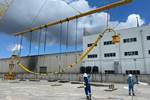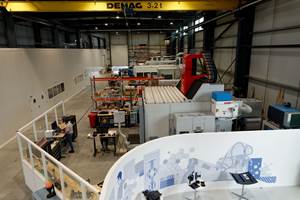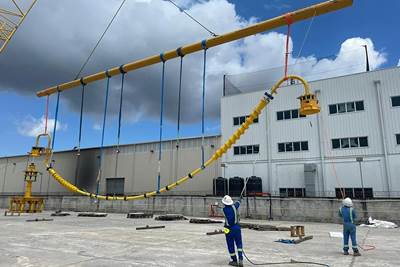The NCC calls for interest in TPC pipe permeability project
The joint industry project seeks to better understand the permeability performance of thermoplastic composite pipes for hydrogen distribution to de-risk for widespread adoption.
Photo Credit: AdobeStock
The National Composites Centre (NCC, Bristol, U.K.) is launching a joint industry project (JIP) that focuses on the permeability of thermoplastic composite pipes (TCPs) for hydrogen distribution and optimal material selection for relevant applications.
According to E4tech’s market analysis, “,” it is projected that upstream distribution pipelines for hydrogen will grow significantly in the coming decades if plans for hydrogen production and end-use are realized. U.K. industrial clusters and initiatives are now developing a local hydrogen value chain, which will require the transportation and distribution of hydrogen within the region and between the hydrogen generation, storage and end-user infrastructures (e.g., Zero Carbon Humber, H100 Fife, H21 and Hynet North West).
Spoolable TCPs are said to offer a compelling alternative to steel pipes for connecting hydrogen production sites either directly with end users or into hydrogen transmission lines, as they are easier to deploy, offer lower potential total lifetime cost of expenditure (TOTEX) and avoid issues around embrittlement of steel. Hydrogen systems come with significant safety considerations that rely on detailed understanding of the performance of the system components. Minimal comparative hydrogen permeability data is currently available for TCPs which creates uncertainty around the performance of different composite materials in hydrogen pipe systems. Increased understanding of permeability performance is essential to unlock and de-risk widespread TCP adoption for hydrogen.
At the NCC, the cross-sector hydrogen team is working to minimize the barriers to deploying composite solutions through a program of work that will help establish a robust supply chain in the U.K.
Commencing this year, the JIP will address the challenge of benchmarking permeability performance of pipe system designs for true comparison, through the manufacture of standardized pipe specimens and permeability measurements to build a liner and reinforcement material capability database. The NCC says this can be used to inform pipe system comparisons, and ultimately enable viable system specification and cost-effective pipe design.
The overarching project aspiration is to minimize material cost to meet permeability targets, which requires bespoke testing on every product, to an engineering variable that is addressed at the design stage. The industrially representative pipe prototypes will be manufactured using automated tape winding (ATW) on a bespoke machine which is being procured by NCC especially for the JIP, and installed at the NCC in late 2023.
“High-performing transportation and storage of hydrogen is one of the technology barriers that needs to be overcome to guarantee containment and leak prevention,” Matt Hocking, head of energy, National Composites Centre,, says. “Measuring the permeability of hydrogen through thermoplastic composites is a key challenge that will be addressed in the project. We are interested in engaging with industry and the supply chain across energy, utilities and transportation sectors.”
At the NCC, the cross-sector hydrogen team is working to minimize the barriers to deploying composite solutions through a program of work that will help establish a robust supply chain in the U.K. As part of this program, the NCC is creating a clear path to design, manufacture and digitally certify hydrogen ready pipes and materials. The NCC is also developing a state-of-the-art manufacturing and test facility for hydrogen transportation and storage, for pressure vessels and pipes. With a pressure test system already in place, a filament winder and TPC winder will be installed at the facility by the end of 2023.
Organizations interested in expressing an interest in joining the TCP for Hydrogen Permeability joint industry program can email energy@nccuk.com.
Read more about the NCC’s other developments for hydrogen, including a design tool for cryogenic hydrogen tank design, its cryogenic storage demonstrators and composites reclamation from pressure vessels.
Related Content
Plant tour: Daher Shap’in TechCenter and composites production plant, Saint-Aignan-de-Grandlieu, France
Co-located R&D and production advance OOA thermosets, thermoplastics, welding, recycling and digital technologies for faster processing and certification of lighter, more sustainable composites.
Read MoreDevelopment of a composite liquid hydrogen tank for commercial aircraft
Netherlands consortium advances cryogenic composites testing, tank designs and manufacturing including AFP, hybrid winding, welding of tank components and integrated SHM and H2 sensors for demonstrators in 2025.
Read MoreWelding is not bonding
Discussion of the issues in our understanding of thermoplastic composite welded structures and certification of the latest materials and welding technologies for future airframes.
Read MoreBraided thermoplastic composite H2 tanks with co-consolidated molded boss areas to fit EV battery space
BRYSON project demonstrates possible designs, automated manufacturing and low permeability concepts, including EVOH liner and novel PPA matrix.
Read MoreRead Next
Strohm secures second “Jumpers on Demand” contract from ExxonMobil
On-site service includes readily available 24+ carbon fiber-reinforced PA12 jumpers to be installed at depths of 1,700 meters for water and gas (WAG) application.
Read MoreCutting 100 pounds, certification time for the X-59 nose cone
Swift Engineering used HyperX software to remove 100 pounds from 38-foot graphite/epoxy cored nose cone for X-59 supersonic aircraft.
Read More










